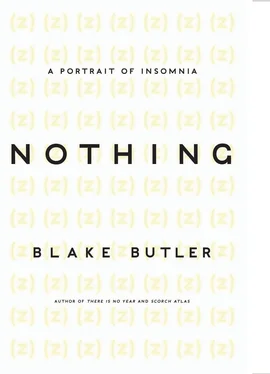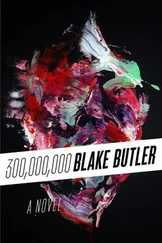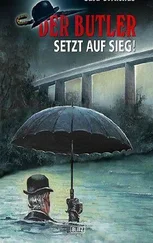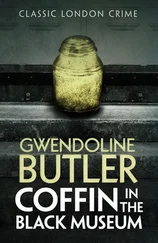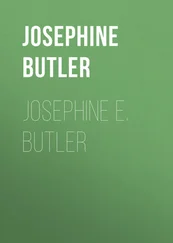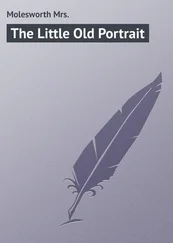All throughout this, somewhere in here, in us each the me goes on: the mechanism at the center of the meat. The me becomes a thing in us that there repeats — a module both automated as a flesh thing and in full selecting larger motions as we do each instant what we do or do not do: fidgets, scratching, walking, thinking, talking, looking, and so on. The repetition of repetition of the trending patterns of these actions makes days seem nearer, more ours, in our own image, less a clothing, more a skin, from more general preoccupations (rising, working, marriage, travel, ideas, passing on our names), down to smaller, taste-based gestures (humor, impulse, preference, pleasure routines, habits of how to sit or stand). Comfort comes in copied action as it makes our surroundings feel like somewhere we have been. The self emerges through holes in the self’s body as speech and gesture, spatial relations with the bodies and objects in our field, the days of trees and heads and houses, of glass and clothes and our machines we select to make the space around us seem slightly more like ours.
For years when renting movies with my family as a child, I often picked the same tape every time. Among the reams of new and unseen, I wanted the one I already knew I liked, and anyway each time it could seem a little different, little bits picked up different or from other angles or burned better with reiteration. The movie, as it stands, was Flight of the Navigator , a Disney picture about outer space. We must have paid to take the thing home at least several dozen times, never bothering to pick up our own copy — sticking instead to the versions shared with all the unnamed others having had it too in their own houses, touching what I touched on the cartridge, doing what they did before the screen. As an adult now, despite the repetition, I can’t recall more than chunks about the film: something about a kid inside an alien orb guided by a talking machine eye; the boy’s body shuttling through time, ending up returning to a future version of his home having been thought disappeared, his family all quite aged. The story in my mind beyond that basic outline is all a blob, lost among junk I’ve watched and done since then. Even all that seeing, wanting, staring, did not bring the thing inside me, beyond my knowing of its entrance; though it is in here, somewhere sleeping — it has been part of my body and will be and is and is.
Also inside the video store was an aisle labeled Horror, which I remember mostly for its long array of sequels of Friday the 13th , a finite but sprawling archive of oblong dark cardboard cases in numbered order, which, assembled as one body, freaked me out: Part One’s image of a hollow torso holding a blood-lined knife, its innards replaced with the image of a forest, four smaller bodies looking back into my gaze, a lake, a moon. Each edition spawned thereafter in a version of that same image, a glow on black, sometimes the body full instead of letters and a thick blank, sometimes simply the image of the mask with the knife stuck inside its eye, or sometimes an intense light gushing from the mask’s holes, unholy glow. These black cases and the cartridges inside them held further rooms in replication, enveloping their own odd objects, a new arm waiting to be brought on into any house, though they scared me more by simply being, a doorway waiting through which many others too had passed, doors which made the doors inside my own house seem that much thinner, holding at night whatever passed around there out. Their presence alone in the light of the store kept me awake, left me up late in the hours fearing what could be coming in the silence, something seeming always on the verge.
Of me at two and a half years, my mother writes: sometimes thinks there’s a giant in the bedroom when it’s time to go to sleep . The entry ends there, without interpretation — she does not mention there was not a giant in my room. She doesn’t need to, does she? For her to say so on paper might seem insane — might seem, to someone reading, as if she were explaining the idea away for herself. And yet there seems something ominous about the implication — my childish thought unanswered remaining there an unsaid door left open, perhaps leading on into some long hall. The very word giant —as opposed to, say, a werewolf or demon, or the vague and yet for some reason widespread young fear of the term robber , or whatever other beasts might terrify a toddler — seems particular for its threat of malformation, a shape too large to fit into the house, a thing that coming in would break my very home wide open, shuck the roof off into the night, allowing whatever else might also want in to flood the space there, eternally exposed.
I can’t help but admit that all this thinking about the rooms and what is in them makes me suddenly hyperconscious about the room behind me even now. I don’t want to have to let myself turn around and confirm the fact that there is no one other in here — notwithstanding all the rooms beyond this one, through the walls, and on and into other houses, none of which from here I can see. Why am I in here, what am I doing . Any instant of any day as an adult one must simply assume there is no giant, mostly before the thought ever occurs. Today, I let me look… and of course there’s no one, just a bookshelf and a bed, an empty room — the room the way it’s always been for years — and yet now I know inside my looking there’s this other space I can’t see behind my head, the focus shifted — something always left out of the frame — as when the body does its turning, the unseen space behind you is turning too — anywhere, all day. The use of mirrors is problematic in its own way and with its own terror — the deepening, the double. To go on, you must concede — every hour, as a human requires constant unexamined minor concessions, otherwise you’d never move — to attend such things is considered ill — each moment passing all surrounded by whatever in its silence — an irreducible, indestructible, indescribable undefined all through all hours — the ever-spinning, all wide open, unto every instant, any door — a mouthless, baseless, unnamed hole surrounding all holes — god of terror, and of boredom, both. The resulting logic of the need for something palpable, recorded, in the face of any minute, is the same evidence many use against the presence of a god— where is nowhere — where am I — how can I prove that I exist and still exist .
Among all these ongoing unrecorded ways, sleep operates as the definitive product of any method of want for rest — another fleshy house with unlocked doors always impending. We nod out to allow time and space to feed, regroup, turn off. A restriction from this wallless, doorless room — insomnia — which might turn on under a variety of means — denies the body of its respite, turns the flesh sickly, makes disruption of the brain, forcing the waking body into diffusion, invoking a sleeplike helpless state while still aware. In not finding rest where we would want it, we end up straining even harder after something always the most where nothing is and wanting more — and in the having of something that is not sleep, never coming to feel quite full — wanting more doors to the house to fill the house with, ever-expanding, giving deeper presence to something that isn’t there. Even the fear of having trouble sleeping, or the fear of the fear of it, the fear of drifting off into something stuck beyond our self, the want for nowhere, for a silence, becomes stronger, fills through the body via the same corridors of emotions such as want or love.
As if in wish to precontrol such ways of access, at age three, I would refuse to leave the house without a ring of keys. I’d see my parents need their keys to open doors and wake up machines and for this I knew I would need them too. My mother issued me a white loop with several differently colored and oblong chips of plastic forming toy teeth rounder than my thumb. The keys directly locked or unlocked nothing, and yet with their shape inside my pocket I felt I could open any door that was not there — the doors the house was hiding — locks I meant to keep locked or unlocked, or to lock or unlock soon in the future. With these keys too I’d open other portions of the earth. I would rub the nub of the green key against the end strut of a shelving unit at the grocery store and hear the sound of some whoosh burst from my mouth. I would insert the red key’s tip into a knothole in a bit of backyard fencing and feel through my body where a space had opened up. I spent many hours in the evenings also with the keys shoved in my mouth, sitting around sucking on their ridged sides one after another or in fat packs, after the keyhole in my head. That these keys all did actually open something I feel now rather sure — though at the time their potential and perhaps their false form held me imagining my body locked, helped me move pleased and safe among the unnamed air.
Читать дальше
